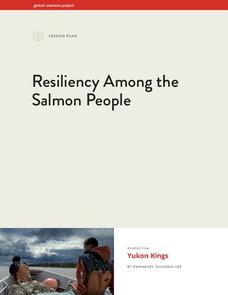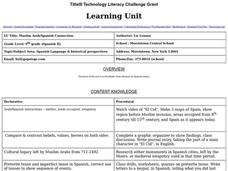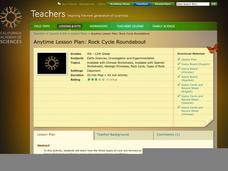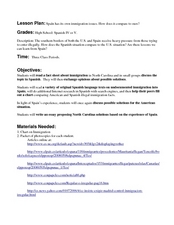Quizlet
Quizlet
Bring your class's study skills into the 21st century with this digital teaching tool. Offering an easy way to create and share customized sets of flash cards with students, parents, and other educators, this resource is a...
Global Oneness Project
Resiliency Among the Salmon People
Is losing cultural traditions the cost of social progress, or should people make stronger efforts to preserve these traditions? High schoolers watch a short film about the native Yup'ik people in Alaska and how they handle the shifts in...
Curated OER
Muslim Arab/Spanish Connection
Ninth graders watch the video, 'El Cid.' They participate in teacher-led discussion about the beliefs, customs, goals, and heroes of both Spaniards and Moors. They create and present an artifact to the class showing the results of their...
Curated OER
The Battle for San Juan Hill: Santiago, Cuba, July 1, 1898
Eleventh graders design and create a poster, advertising for recruitment of volunteers to serve with Teddy Roosevelt in the 1st Volunteer Calvary Regiment. Students create a historical newspaper front page, from the time period, which...
Curated OER
The Effects of European Exploration on the Americas
In this effects of European exploration on the Americas study guide worksheet, students read a brief overview pertaining to the time period in world history and then respond to 2 reflection questions.
Curated OER
The Birth of the American Empire as Seen Through Political Cartoons (1896-1905)
Students explore the concept of political cartoons. In this political cartoons lesson, students examine political cartoons from different time periods in American history and respond to questions regarding them.
Curated OER
"An Eye For An Eye, A Tooth For A Tooth"
Sixth graders debate their reactions to two different historical documents about managing a society. In this U.S. history lesson, 6th graders read two articles on codes and laws from different time periods and debate their...
Curated OER
Charles Young Photographs
Learners analyze photographs as an introduction to the Spanish American War. The concepts of American expansionism are explored through the process.
California Academy of Science
Rock Cycle Roundabout
After a basic introduction to the rock cycle and the three main types of rocks, young geologists can deepen their understanding of how rocks change through a fun learning game. Based on the characteristics and events shared by a reader,...
Curated OER
USH Test One
Eleventh graders write about one reason immigrants came to the United States in the late 1800's. They take a test that focuses upon past concepts and then an introduction is given by the teacher for the concepts of Imperialism and The...
Curated OER
Oh Picasso!
Students identify the painter Picasso as a famous Spanish cultural figure, name at least one of Picasso's painting styles and describe aspects of Picasso's Blue Period. They create their own Blue Period inspired work of art.
Curated OER
Qu¿¿ tiempo hace?
Students use the internet to gather information on Spanish cities and its weather. After completing a worksheet, they compare and contrast the weather conditions for the cities they researched. They share their information with the class.
Scholastic
The Rise of Railroads: Illinois
Railways not only cross the US, but they are also intertwined with the history of America. Using a timeline format, individuals explore the connections between major events in American history—such as the Civil War—and the rise of the...
Curated OER
Family Pictures (Cuadros de Familia)
Designed to be spread across multiple days, this mini-unit gives learners an opportunity to develop family related vocabulary. Start by reading selected pages from "Family Pictures-Cuadros de familia" by Carmen Lomas Garza, and then...
Curated OER
Immigration in Spain
How many people immigrate to Spain illegally each year? Both the United States and Spain see a lot of illegal immigration. Advanced learners will read various articles, compare and contrast the situation in both countries, and discuss...
Curated OER
Fun with Food
Students explore the Spanish equivalents for everyday food items and determine reasonable prices for those items using the currency of Spanish speaking countries.
Yummy Math
Happy 14th B’ak’tun, the start of the next Great Mayan cycle
The ancient Mayans had a complex calendar and number system with a rich history. In fact, the date 12/21/2012 was the center of much controversy as to whether or not it was the end of time. It wasn't the end of time, but...
Curated OER
The Study of the Spanish-Speaking People of Texas: Immigration
Students identify the meaning of the following terms: immigrant, immigration, migrate, and assimilation. They identify reasons that immigrant groups came to Texas and explain where groups settle and the influence these groups have on...
Curated OER
A Pair, A Panel, A Presentation: Creating an Image for Your School
Students create a screen for the school. They work as a group to create a screen using various scenes from the school. Once they have finished their project, they explain why the artist chose to use the scenes from his time period.
Curated OER
The Industrial Revolution
Eighth graders examine the time period of the Industrial revolution in American history. In this American History lesson, 8th graders read the chapter on this time period. Students create a presentation on this time period to...
Curated OER
El Museo Del Prado Challenge
High schoolers discover the role of art in Spanish culture. Using a CD-ROM, they complete questions on a worksheet in groups. They research information about famous Spanish painters and world museums. Competing against other groups of...
Huntington Library
Further Exploration - Exploring the California Missions
How did Native Californians and Franciscans influence one another in early California? Learners analyze a few cultural pieces to examine the impact that integration had on Franciscan and Native Californian culture.
Roy Rosenzweig Center for History and New Media
War and Poetry
A band of brothers or the Devil's agents? Nobel warriors freeing the oppressed or mercenaries working for the military/industrial complex? Groups examine poems from the Civil War, World War I, and World War II to determine the poets'...
Curated OER
My Family and Our Nationality
After completing the activities included here, your beginning foreign language speakers will be able to name family members, identify a family's place of origin, and write short sentences about family members. They start by listening to...

























